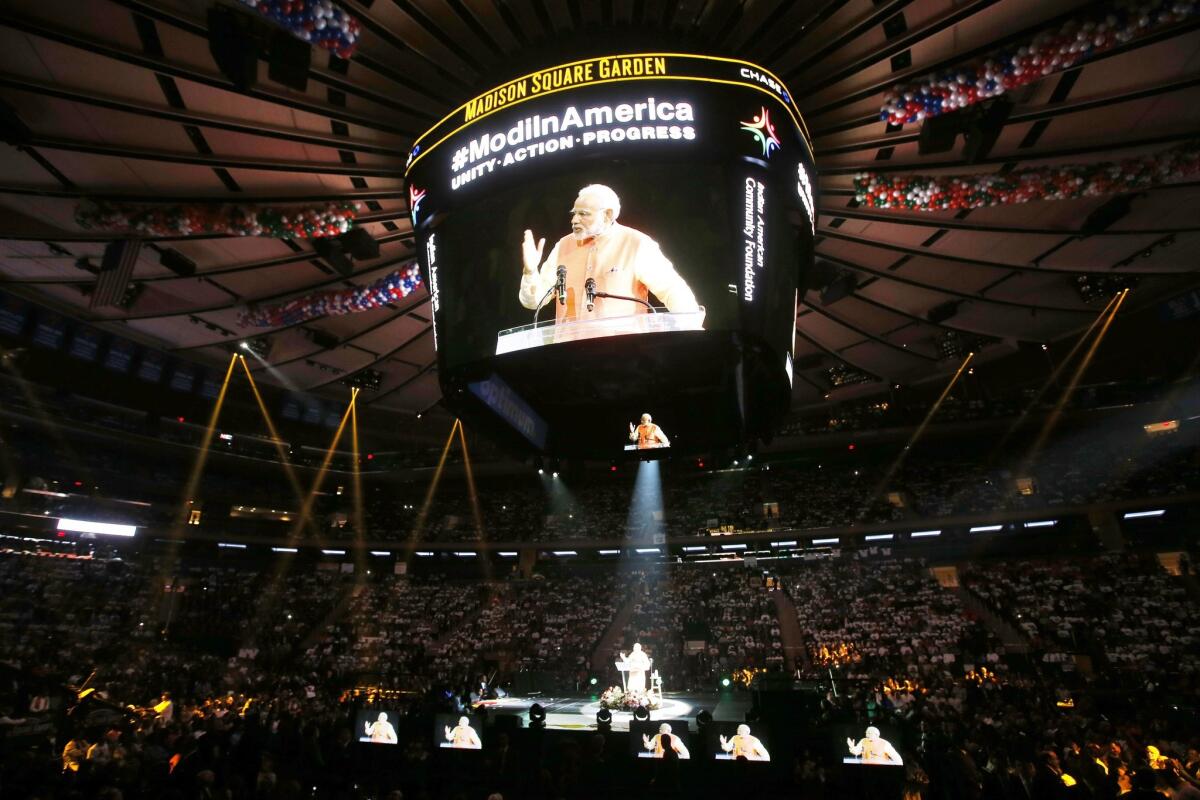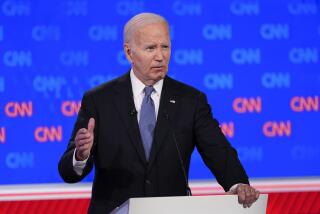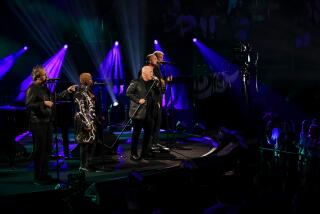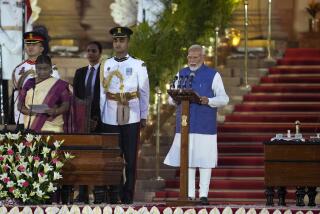India’s prime minister gets rock-star reception in New York

- Share via
Reporting from New York — Madison Square Garden often hosts cultural icons such as Bob Dylan, Bruce Springsteen and Bono, but on Sunday the storied arena offered rock-star treatment to a political personality: Indian Prime Minister Narendra Modi, who made the case for a resurgent India to nearly 20,000 hugely enthusiastic supporters.
His reception capped a remarkable turnaround. For more than a decade, Modi could not get a U.S. visa amid allegations that, as chief minister of the state of Gujarat in 2002, he failed to halt sectarian violence that claimed the lives of 790 Muslims.
That was all but forgotten inside, if not outside, the Garden. Amid loud chants of “Mo-di!” the leader stood on a rotating platform and pledged to “confirm the India of your dreams.”
“To bring quality of life to India, the government you have chosen will not leave any stone unturned,” Modi said in a Hindi-language address lasting more than an hour. To deafening cheers, he added: “You have given me a lot of love. I will repay that loan.”
Part political pep rally and part nationalist commercial, Modi’s speech was a key stop on his U.S. tour, his first since his landslide victory in May. On Saturday, he spoke at the United Nations, and on Monday and Tuesday he will visit the White House.
But The Garden event marked a different type of moment. It was the highest-profile public appearance in the West for a leader whose reform-minded charisma has drawn comparisons to a 2008-era Barack Obama.
At the U.N., Modi offered some geopolitical tea leaves for pundits to read on foreign-policy issues such as Pakistan and China. At Madison Square Garden, he turned the focus inward, to domestic questions such as the economy, sanitation and, particularly, technology, which he leaned on to rally the audience.
“Our country has evolved a lot,” he recalled in a story about an interaction he had with a Chinese interpreter recently who asked him whether India was still a land of snake charmers. “They used to play with a snake,” he said he told the interpreter. “Now they play with a mouse.” (Modi has used social media to his electoral advantage, and Sunday’s event proved no exception, with #ModiAtMadison a top Twitter trending topic in the U.S. many hours after the speech ended.)
The event — with thousands of T-shirt-clad and flag-waving attendees roaring their support and an assortment of camera-friendly minority groups seated in the lower sections of the arena — was mounted by an immigrant organization known as the Indian American Community Foundation. To afford the venue rental and other costs, the group raised about $1.3 million from wealthy private donors. The remaining $200,000 came via crowdfunding, according to lead organizer Bharat Barai, an Indiana-based doctor and longtime friend of Modi.
About 14,000 tickets were distributed via several hundred Indian American organizations, and an additional 2,000 by lottery; all were free. The remaining tickets went to leaders and backers of the event.
Barai said there was demand for tens of thousands more, and he was still fielding hundreds of desperate requests on Saturday. “I had someone write me and beg me for a ticket for his pregnant wife because he wanted his unborn child to hear the speech,” he said. “It was that popular.”
Those who made it in witnessed an address that was a skillful exercise in populism, showcasing Modi’s vaunted ability to shift tones. The prime minister repeatedly invoked Mahatma Gandhi and the colonial-era independence movement even as he called for India to lead an Asia-centric future; he eagerly talked about brass-tacks issues such as building more toilets minutes after lauding the current mission to Mars.
And he drew loud applause when he noted that the spacecraft that just reached Mars’ orbit, which famously cost only about $75 million, worked out to fewer rupees per kilometer than most Indian taxi rides.
On issues from homelessness to foreign investment, immigration to the toxic Ganges River, Modi said he hoped to “change the destiny of India.” A video before the speech asked supporters to “witness a century of change in his first 100 days” as it cited his catch-phrase of “minimum government, maximum governance.”
But whether the politician can make good on his bold promises remains to be seen. With a population of 1.25 billion, India is the world’s largest democracy, and its most unwieldy.
Modi, a member of the conservative BJP party, was elected in the spring after discontent grew over India’s long-ruling Congress party. Yet with economic disparities high, corruption rampant and new investment in the country slowing, he faces daunting challenges. India’s religious minorities have described a host of challenges as well, and opponents say that the Hindu leader has not shown sufficient resolve in tackling them. On the international front, conflicts continue with China and Pakistan over disputed borders; a three-week troop standoff with China ended days ago.
Even before Modi began to speak, pageantry ruled. An artist painted a giant portrait of Modi as traditional dancers swirled around him, and a Bollywood star put on a laser light show, the colored vectors bouncing off Knicks championship banners.
Despite the pomp, Modi sought to emphasize a salt-of-the-earth image. Recounting how some advisors told him it was a mistake to talk about workaday concerns, he said he replied, “My friends, look, I came here selling tea” — a reference to his roots as a vendor at Gujarat’s Vadnagar railway station. That sent the crowd into an even bigger tizzy.
Earlier in the weekend, enthusiasm ran high amid the salons, shops and sari palaces of Jackson Heights, a hotbed of South Asian culture in a metropolitan area that contains more than 600,000 Indian Americans, the largest Indian community in the Western Hemisphere.
As he stood outside a branch of Patel Brothers supermarket in Jackson Heights, a food-truck proprietor named Yuvaraaj Thakkar said he would be glued to an Internet feed of the event. “I’m not a supporter,” he said. “I’m a believer.”
Despite memories of the 2008 election in their adopted country, few seemed concerned that the frenzy was creating an impossible standard. “Obama makes it about theory, but Modi can put it into practice,” said Sushila Gadkar, who works in a beauty parlor.
Farther east, in Flushing, retiree Kumar Shankar said there was a bipartisan quality to the excitement. “I don’t think it’s about politics. If he can bring law and order, he will earn all this goodwill.”
On Sunday, Modi’s speech also buttressed his reputation as an administrator. He addressed such issues as bank accounts for the impoverished and a more accommodating visa process for those visiting India. The willingness to delve into the nitty-gritty played well with the Garden crowd, offering a kind of grounding to his soaring rhetoric.
“I like that he speaks about small things, because the big things I can’t always relate to,” said Deepak Pansari, an IT professional who drove 10 hours from Charlotte, N.C., after he and his wife won tickets in the lottery.
Rep. Ed Royce (R-Fullerton), who chairs the House Foreign Affairs Committee, was one of several dozen U.S. lawmakers at the event. He believes the speech marked a watershed moment. “The prime minister electrified the crowd in a way that I believe we need in order to look at future opportunities and engagement with India on a series of issues,” he said in an interview.
That opinion was not universal, however.
Outside Madison Square Garden, several hundred protesters massed, citing the 2002 Gujarat religious riots and carrying signs likening Modi’s Hindu-centric vision of India to Hitler’s Germany. Many were of Sikh and Muslim background, and they handed out brochures with Modi’s picture headlined, “Does this man deserve to be treated like a rock star?”
“What Modi has done and will continue to do is oppress minorities,” said Dr. Amarjit Singh, a Sikh leader and protest organizer who backed a symbolic lawsuit filed in New York over the Gujarat riots. “You can say it’s about progress, but his track record says it’s persecution.”
More to Read
Sign up for Essential California
The most important California stories and recommendations in your inbox every morning.
You may occasionally receive promotional content from the Los Angeles Times.











